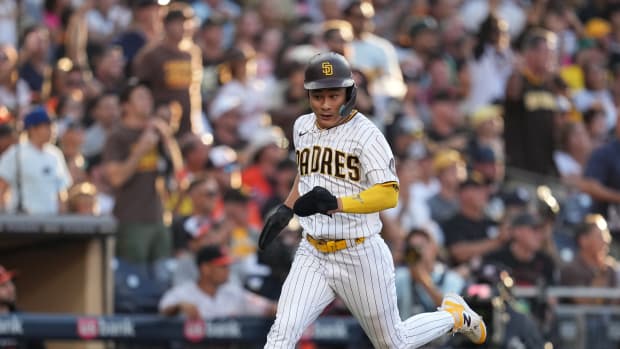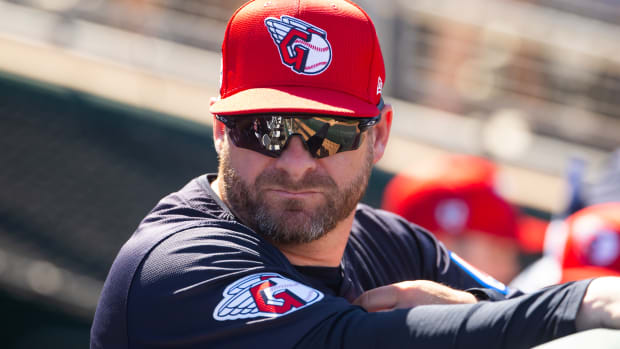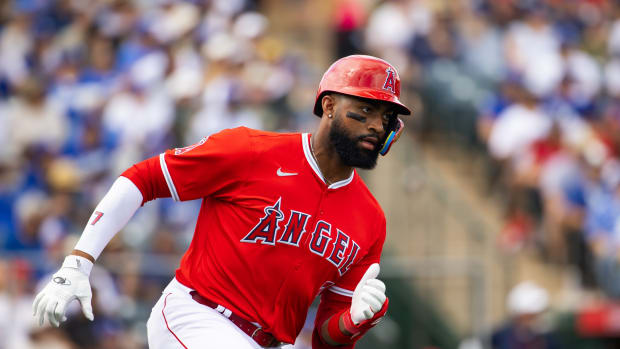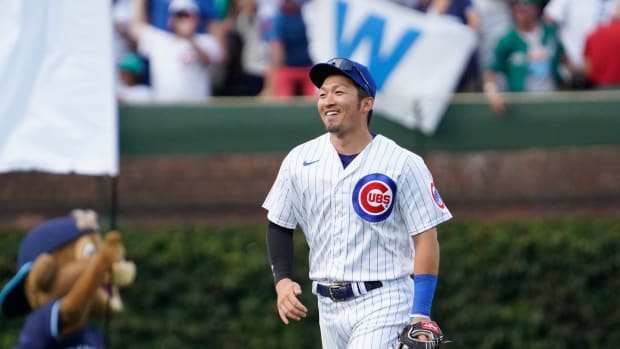MLB Couldn't Stop Kyler Murray From Playing Football, But His Decision Is Cause for Worry
If you’re surprised by Kyler Murray’s decision to pick football over baseball, you shouldn’t be. On Monday afternoon, the Oklahoma product announced on Twitter that he was “firmly and fully committing my life and time to becoming an NFL quarterback.” The move ends a saga that started last June, when the Athletics picked No. 9 in the MLB draft, and ramped up as Murray put together a Heisman Trophy-winning season as the Sooners’ quarterback. After Oklahoma lost to Alabama in the Orange Bowl, Murray subsequently declared for the NFL draft while both the A’s and MLB tried frantically to keep him on the baseball path.
In the end, they failed at that goal, but it’s easy to understand why. If Kyler Murray truly in his heart wanted to play professional football instead of professional baseball, then nothing Oakland or Rob Manfred or anyone else could have offered was going to sway him away from the sport he loves. The league isn’t at fault for Murray following his passion, and it’s too simplistic to say that MLB couldn’t pay him enough—his signing bonus with the A’s was just under $5 million—to play baseball. But in another sense, that statement is true: MLB couldn’t offer Murray enough to win him away from the NFL, and for that, Manfred and the rest of the folks at 245 Park Avenue can only blame themselves.
At the end of the day, the money was on the NFL’s side. Thanks to MLB’s draft-slotting rules, the $5 million bonus from the A’s is the most they were allowed to give him. As an end-of-the-first-round selection in the NFL draft, he’ll get at least that much; if he goes within the top five, he’ll make five or six times that. Maybe a major league contract could have won him over, as it did for fellow two-way star Jeff Samardzija when the Cubs drafted him in 2006, but MLB restricted teams from offering those to draft picks in the 2012 collective bargaining agreement.
WERTHEIM: Is Nick Francona a Whistleblower or Just Disgruntled?
Moreover, while Murray the football player would have the opportunity to increase his earnings significantly after three years in the NFL, Murray the baseball player would enter a system that doesn’t reward the most productive years of a player’s life. That, too, is according to the league’s design—one that artificially suppresses salaries for young players through the arbitration system and keeps them from unfettered free agency for half a decade (where the owners have now also decided to keep their checkbooks closed, too). And that would have come for Murray only after who knows how many years in the minor leagues, playing for pennies in tiny towns and small stadiums while the A’s delayed his major league debut in order to game his service time.
MLB couldn’t compete, either, with the promise of instant stardom and endorsements and all the other incentives that would have come with being in the NFL. You can’t blame the league for that, but it does represent how precarious baseball’s position on the media map is, as MLB fights the NFL and NBA for the eyeballs and dollars of fans. The league’s marketing issues have existed long before Murray popped up, but his choice illustrates at some level that, against the behemoth that is the NFL, baseball doesn’t have the same tools to turn a player into a household name.
The irony of this is that, while the loss of Murray has to sting for Manfred and the league, its effect on baseball will be relatively small. Being a first-round pick is no guarantee of major league success, and Murray’s immediate future was bus rides through the California League, not plate appearances in the big leagues. This isn’t the equivalent of Ken Griffey Jr. or Bryce Harper walking away from the game; Murray is hyper-talented but plenty raw—possibly a star, but not a phenom. And none of that is to knock Murray, but only to acknowledge how brutally difficult it is to play professional baseball—likely another factor in his choice to pick the NFL. Professional football is no cakewalk itself, but it does offer a better landing spot for his particular skills as a highly mobile and strong-armed passer in a league where that’s now all the rage.
VERDUCCI: Frank Robinson's Devotion Is What Set Him Apart
But as Murray leaves baseball, it’s worth wondering whether or not he represents some grander failing on the part of the sport: Is baseball a destination for the country’s best and brightest athletes? Murray is a unique case as someone good enough to play both baseball and football at a high level, but the decision of which sport to pursue is one already happening at lower levels, as adolescents turn into teenagers and have to pick one sport going forward. (Part and parcel of that choice is the risk of concussions and brain injuries inherent in football, but while participation in the sport has begun to decline, it remains the No. 1 sport in the country for high school athletes, so that fear is evidently not enough to take it immediately off the table for most.)
There will always be kids who choose baseball, either because they love it the most or because their talents on the diamond outstrip their skills on the gridiron or basketball court. But just as Murray had to weigh the NFL versus MLB, so too will thousands upon thousands of kids in youth leagues or high school or college. And with baseball becoming both increasingly expensive, professionalized and difficult at the youth level—kids who harbor major league dreams are forced into endless travel ball circuits, highly competitive All-Star leagues and expensive private coaching before they’ve even reached puberty—it’s easy to see those would-be Kyler Murrays choosing football or basketball, too.
That, more than anything, is what baseball should fear: That Murray’s choice isn’t simply one man capitalizing on his abilities, but a sign of how hard the sport will have to work to capture the minds and hearts of the next generation—and that at the end of the day, it may not be enough. Murray picking football over baseball is no surprise at all; for MLB, that may be the worst part of it all.


































